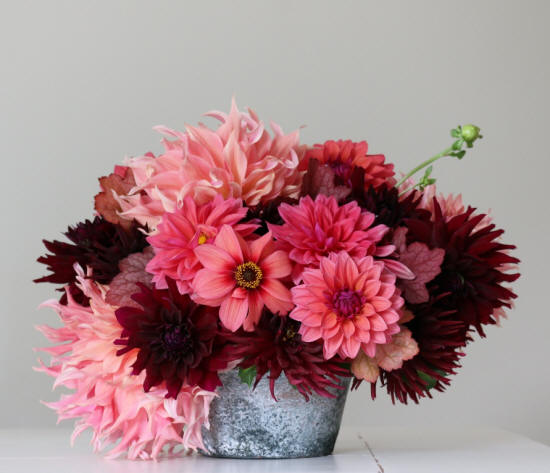|
 Dahlias
Bring Diverse Shapes, Sizes, Colors to the Garden Dahlias
Bring Diverse Shapes, Sizes, Colors to the Garden
By Melinda Myers
 Send a link to a friend
Send a link to a friend
[February 19, 2019]
Dahlias have been a fixture in summer flower gardens
for generations. But it may be time to update your idea of dahlias!
With hundreds of varieties to choose from in a fabulous array of
colors, shapes and flower sizes, it is no surprise the National
Garden Bureau has declared 2019 the Year of the Dahlia. Join the
celebration and brighten your garden with dahlias this year.
|
|
 Not only are dahlias beautiful, but they’re also
easy to grow. Just plant the tuberous roots in a sunny, well-drained
location, once the soil has warmed to about 60 degrees – or around
the same time as you would plant tomatoes. It takes a week or two
for the first shoots to emerge, but the plants grow quickly and will
be blooming by midsummer. Not only are dahlias beautiful, but they’re also
easy to grow. Just plant the tuberous roots in a sunny, well-drained
location, once the soil has warmed to about 60 degrees – or around
the same time as you would plant tomatoes. It takes a week or two
for the first shoots to emerge, but the plants grow quickly and will
be blooming by midsummer.
Grow dahlias in containers to brighten your balcony, deck or front
steps. They combine nicely with other plants in containers as well
as in the garden. Mix them with bold, leafy elephant ears, Lacinato
kale and Swiss chard; finely textured ornamental grasses and gaura;
upright salvias and gladiolus; and trailing plants like calibrachoa,
verbena and ivy. Dahlias will add pizzazz to your gardens and
landscape, especially in the second half of the summer when many
other flowers are starting to wane.

Dinnerplate dahlias are bodacious beauties that command your
attention. They include any variety of dahlia with flowers that are
at least eight inches in diameter. These extra-large blossoms are
produced on bushy plants that grow 3 to 6 feet tall. Favorites
include Café au Lait, Vancouver and Thomas Edison. Use stakes to
help support the flowers and keep the plants standing upright.
Decorative dahlias offer the widest array of colors and styles.
Their petals are flat to slightly rolled and flower sizes vary from
4 to 8 inches. Growing an assortment of several different varieties,
like the Spice Mix Decorative Dahlia Collection (longfield-gardens.com),
lets you enjoy a color-coordinated blend of hues that combine well
in both the garden and in a vase.
For dahlias with a completely different look, grow cactus and
semi-cactus types. Their rolled or partially rolled petals give the
flowers a spiky texture. Varieties such as Yellow Star and
burgundy-maroon Nuit d’Ete will add style and sophistication to your
garden.
[to top of second column] |

Make sure your flower garden also includes a few ball
and pompon dahlias. These perfectly round swirls of tightly rolled
petals come in vivid colors, and their long vase life make them a
favorite with floral designers. Use coppery-orange Mirella or vivid
Boom Boom Red to weave shots of color throughout an arrangement.
For contrast, incorporate some single, peony-flowered, anemone and
collarette types. Dahlias such as HS Date, Bishop of Dover and
Fascination have fewer petals and slightly smaller blooms, which
makes them good companions for annuals as well as perennials. Plus,
their daisy-like centers are magnets for bees and butterflies.
Bring your dahlias up close with dwarf varieties, commonly known as
border dahlias. These plants grow just 12 to 24 inches tall, yet
most have big, 4 to 5” blooms. Popular varieties include Gallery
Pablo, Melody Swing and Gallery Art Nouveau. They are ideal for
small spaces, lining a walkway and are a perfect addition to
containers.
With so many colors and flowers styles to choose from, growing
dahlias can become a life-long adventure. Make room in your garden
for some of these easy-to-grow, easy-to-love, summer-flowering
bulbs. You’ll discover why so many gardeners have fallen under their
spell!
[Photo credit: Longfield Gardens]
Melinda Myers has written more than 20 gardening books, including
Small Space Gardening. She hosts The Great Courses “How to Grow
Anything” DVD series and the nationally syndicated Melinda’s Garden
Moment TV & radio segments. Myers is a columnist and contributing
editor for Birds & Blooms magazine and was commissioned by Longfield
Gardens for her expertise to write this article. Her web site is
www.MelindaMyers.com.
 |